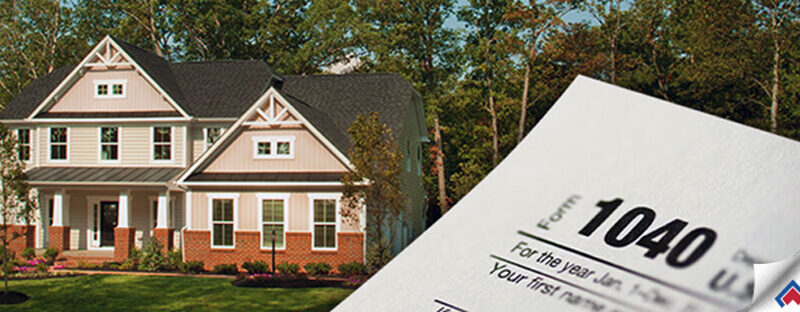The federal government offers a variety of tax deductions for homeowners. This can help them cut their taxes and put money back in their pockets. Homeowners can make use of deductions that renters can’t take advantage of, such as home office and property tax deductions. Although homeowners’ tax deductions might amount to thousands of dollars, claiming them is only worthwhile if your total itemized deductions surpass the IRS basic deduction. This article focus on the various tax deductions for homeowners in 2023, as well as mortgage and primary residence tax deduction. Have fun reading!
Tax Deductions For Homeowners 2023
Generally, tax deductions can save you hundreds or thousands of dollars each year as a homeowner. Certain deductions, such as mortgage interest as well as property taxes, may save and put money into your pocket year after year. However, it’s usually only worthwhile to itemize your deductions if they exceed the IRS standard deduction. Subsequently, the standard deduction for the 2021 tax year is $12,550 for single filers and $25,100 for married couples filing jointly.
What is a Tax Deductible Expenses?
When filing taxes, a tax-deductible expense is one you are able to deduct from your adjusted gross income. Generally, you’ll pay less in taxes if your taxable income is minimal. A standard deduction is a cash amount that, depending on your filing status, age, and other factors. That reduces the amount of income that is taxed. Individual deductions, such as specific homeowner expenditures and charity contributions, are part of itemized deductions. Nevertheless, you can only pick one between the standard deduction and itemized deductions when filing your taxes.
Below are the various deductions available to homeowners to save more money year to year.
#1. Mortgage Interests
Generally, when you buy a home either as a single or married filing jointly, you can deduct interest on up to $750,000 of your principal debt. However, if you’re married and filing separately, you will be able to deduct up to $375,000 in interest paid. Alternatively, if you acquired your property before October 14, 1987, you can deduct all of your mortgage interest.
Likewise, you can deduct interest paid on up to $1 million over the life of your mortgage. This however is if you acquired your property between October 14, 1987, and December 15, 2017.
#2. Home Equity Loan Interest
A home equity loan is a type of the second mortgage in which you borrow against the value of your property. You have $50,000 of equity if your home is worth $350,000 but you still owe $300,000.
The interest you pay on your home equity loan may be tax-deductible. Meanwhile, there are no constraints or limitations to how you can make use of the money from a home equity loan. Nevertheless, you only qualify to deduct the interest if you use it to make a significant home renovation. However, this only started after the Tax Cuts and Jobs Act of 2017. Before that, you can deduct the interest on these loans regardless of how you used the money. This deduction is only available if you use the borrowed money to do a home improvement.
#3. Discount Points
After getting a mortgage, you may have the option of buying discount points to minimize your interest rate. One discount point is one percent of the mortgage amount if you have this choice. This is to say a discount point costs 1% of your new mortgage and lowers your interest rate by 0.25 percent. Generally, the money you spend on discount points throughout the life of the loan is usually tax-deductible. You may be able to entirely deduct your discount points if you meet a number of Internal Revenue Service standards.
#4. Property Taxes
If you own a home, you can not escape property taxes cost. You can deduct up to $10,000 in property taxes every year. However, that $10,000 also includes any state and local taxes you want to deduct. Nevertheless, you can only deduct $6,000 of your property taxes if your property tax payment is $8,000 and you deduct $4,000 in state taxes.
#5. Home Office Expenses
If you’re operating a business in your vicinity, you might be able to deduct the cost of keeping or maintaining a home office. Generally, you have two options for calculating your deduction. First is to calculate your entire housing expenses, including everything from electricity to internet bills. And then you deduct the amount of your home that your office occupies. Otherwise, in another instance, if you own a 2,000-square-foot house and your office occupies 200 square feet, you can deduct 10% of your qualified expenses.
On the other hand, the simplified technique, which allows you to deduct $5 per square foot of office space up to 300 square feet, is another alternative. However, the IRS requires that you must be using your home office for regular and exclusive business. This is so as to qualify for a deduction.
#6. Mortgage Insurance
For the tax year 2021, the expense of mortgage insurance will be deductible. However, it’s still unclear if mortgage insurance payments after 2022 will be tax-deductible. Nevertheless, according to the IRS, the amount of mortgage insurance paid is regarded as mortgage interest. Applicants must have an adjusted gross income of less than $109,000. Alternatively, you must have $54,500 if you are marital and filing separately.
On conventional mortgages, you can deduct private mortgage insurance; on FHA mortgages, you can deduct mortgage insurance. Likewise, on VA mortgages, you can deduct the financing charge. While on US Department of Agriculture mortgages, you can deduct the guarantee fee.
#7. Home Improvements
Modifications or upgrades to your home’s value that are permanent are only partially deductible. Likewise, the proportion of rising property value is will be deducted from the deductible cost. However, many accessibility modifications, like building entrance stairs, expanding doorways, or installing railings as well as support bars do not enhance the home valuation. And as such, can be entirely deducted.
Mortgage Tax Deduction
When you file your tax return, the mortgage interest tax deduction allows you to deduct the amount of interest you pay on your mortgage from your taxable income. The deduction may help you save money on your taxes. While the amount of the loan is limited, the deduction includes interest on any loan used to construct, purchase, or improve your primary residence.
The mortgage interest deduction is an itemized deduction that allows homeowners to deduct interest paid on any loan used to construct, acquire, or repair their property. Likewise, you can also claim it if you own rental property or a second home, but there are some restrictions.
How Mortgage Tax Deduction Work
In 1913, the mortgage tax deduction was combined with the income tax. It has now become arguably the most popular tax deduction among millions of homeowners in the United States. However, the Interest paid on rental properties’ mortgages is also deductible. But it must be recorded on Schedule E.
The deduction was altered by the Tax Cuts and Jobs Act (TCJA), which was passed in 2017. Generally, It lowered the maximum mortgage principal eligible for interest deductibility from $1 million to $750,000. An estimated 135.2 million taxpayers in the first year chose the standard deduction. Meanwhile, that was only after the enaction of the TCJA. However, there are more than 80 million mortgages outstanding in the United State. This implies that the large majority of homeowners do not benefit from the mortgage interest deduction.
Homeowners can either itemize their mortgage interest expenses or take the standard deduction but not both to get mortgage tax deductions. Lines 8 through 8c of Schedule A are used to calculate mortgage interest charges. These however are subsequently transferred to line 12 of the 2021 Form 1040.
Qualification for Mortgage Tax Deduction
The Tax Cuts and Jobs Act (TCJA) reduced the amount of interest that homeowners could deduct from their taxes. However, some homeowners may be able to deduct all of their mortgage interest. Generally, the date of the mortgage and the usage of the proceeds determines the amount of the deduction.
Taxpayers who are single or married filing jointly can only deduct interest on the first $750,000 of their income. In addition, married taxpayers filing separately can deduct $$375,000 on their mortgage. This is not the same as before when taxpayers will deduct mortgage interest on the first $1 million. And $500,000 for married couples submitting their mortgages separately.
You can deduct all mortgage interest if the homeowner’s mortgage satisfies the requirements below all through the year. However, mortgages taken out by a certain date established by the Internal Revenue Service (IRS) are eligible for the deduction.
- There are no limits on mortgages granted before October 13, 1987.
- This means that taxpayers can deduct any amount of mortgage interest from their taxable income.
- Mortgage interest on the first $1 million ($500,000 for married filing separately taxpayers) of a mortgage obtained between Oct. 13, 1987, and December 16, 2017. And at the same time, residences sold before April 1, 2018, can be deducted.
- The sales contract for the latter must have been signed by December 15, 2017, with the closing taking place by April 1, 2018.
Primary Residence Tax Deduction
Generally, the type of home you are financing will have a great impact on the mortgage rate. Mortgage rates are often lower for primary residences. Nevertheless, you may be able to deduct the interest you pay on your primary and secondary residence mortgages. This is up to a certain maximum.
Interest paid on loans for no more than two houses as a primary residence is eligible for the mortgage tax deduction.
It could be for a permanent dwelling, a second home, a vacation home, a boat, or even a recreational vehicle. People frequently assume that the largest mortgage payment for your primary residence will result in the largest tax deduction. However, this is not always the case.
As a rule, taxpayers can deduct up to $750,000 of mortgage interest on a home under a new regulation. This new regulation took effect in the 2018 tax year. However, you must itemize deductions on Schedule A of Form 1040 to be eligible for your primary residence tax deduction.
The fact that you get a tax deduction for the mortgage interest you pay isn’t the only advantage of having a primary residence. Also, there are other benefits when you sell your property. You may qualify for capital gains tax deduction on your primary residence.
Primary Residence Capital Gains Tax Deduction
When you sell an asset that has appreciated in value, you must pay capital gains tax. However, if you decide to sell your primary residence and it has appreciated in value, you may get a capital gains tax deduction from the sale proceeds. The IRS now allows taxpayers to deduct up to $500,000 in capital gains for spouses filing jointly and $250,000 if they are single.
For instance, let’s say you spend $200,000 on a home that happens to be y our lone home and principal residence. Years later, you decide to sell it for a higher price after relocating. At the end of the day, your profit is $50,000 upon deducting the costs of the selling. As a rule, you won’t have to pay capital gains taxes on that profit. However, it is only if you meet the criteria for the exclusions. Generally, depending on your income, the rate of capital gains tax rate is 0%, 15%, or 20%.
However, to be able to claim a tax deduction on your primary residence, you must meet the below requirements:
- In the previous five years, you must have owned your house for at least 24 months.
- It had to be your principal abode for at least 24 months in the prior five years.
- In the last two years, you can’t have claimed another capital gains exclusion.
Conclusion
Generally, tax deductions can save you hundreds or thousands of dollars each year as a homeowner. Certain deductions, such as mortgage interest as well as property taxes, may save and put money into your pocket year after year. However, it’s usually only worthwhile to itemize your deductions if they exceed the IRS standard deduction.
Tax Deductions For Homeowners FAQs
Is a new roof tax-deductible in 2023?
Unfortunately, you cannot deduct the cost of a new roof. Installing a new roof is considered a home improvement and home improvement costs are not deductible.
Can I write off my home office?
You can write off up to 100% of some expenses for your home office, such as the cost of repairs to the space. Invest in You: Ready.
What deductions can I claim for 2023?
2023 Standard Deductions
- $12,950 for single filers.
- $12,950 for married couples filing separately.
- $19,400 for heads of households.
- $25,900 for married couples filing jointly.
- $25,900 for surviving spouses.
What is tax deductible for a primary residence?
Tax Break When You Sell Your Home. The short version of the rule is that if you have lived in your primary residence for two of the past five years, you can exclude up to $250,000 of profits from being taxed. If you are married, that number doubles to $500,000.






